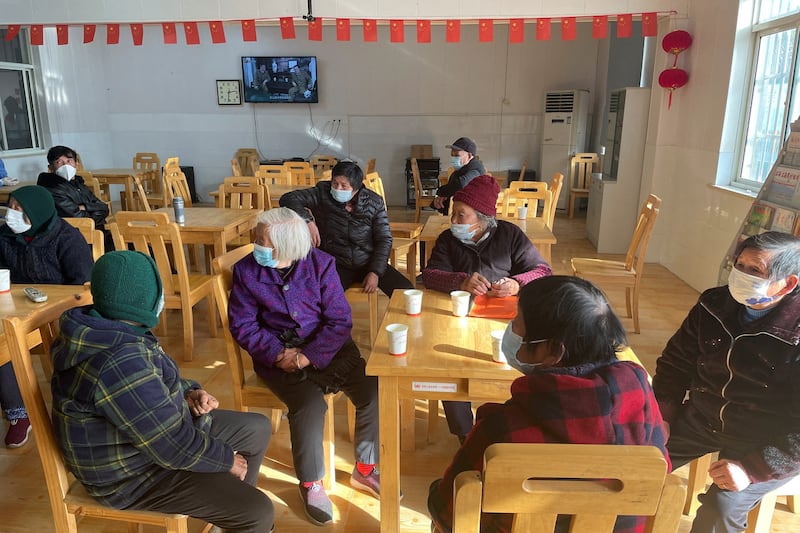The ruling Chinese Communist Party's propaganda machine has cranked into action in the wake of "silver protests" by thousands of retired workers in two major cities this week, warning people not to believe "rumors" that medical insurance reforms will leave pensioners worse off.
"A lot of elderly people in Wuhan were bewitched by rumors and took to the streets," the "My medical insurance" official account on the social media platform Weixin wrote in a post after tens of thousands of retirees took to the streets in the central Chinese city and the northeastern city of Dalian, facing off with hundreds of police and singing communist anthems to protest changes to their medical insurance payouts.
The post referred to an earlier protest by thousands outside Wuhan municipal government headquarters on Feb. 8, but made no mention of the much larger protests on Wednesday.
There were signs that police and local officials were also moving in to carry out "ideological work" with people who attended Wednesday's massive protest.
A protester surnamed Gao from Wuhan said the authorities have been calling him non-stop since yesterday, with an unspecified number of his fellow protesters detained.
"It's like the white terror now," he said, in a reference to mass arrests following public shows of dissent. "Nobody dares take to the streets any more."
"They're calling people and detaining people one by one."
But he declined to comment further.
"I dare not tell you too much, because I'm afraid that they are monitoring [my calls]," Gao said, adding that the new rules would definitely leave retirees at a disadvantage.
China growing older
Hitting out at the protesters' claim that the reason for the current round of medical insurance reform was the massive cost of COVID-19 testing under the zero-COVID policy that ended in December 2022, the account claimed that the cashbacks made available via the schemes had been "misused" by beneficiaries of state insurance policies to buy goods other than medicines.
But protesters told Radio Free Asia on Wednesday that they had relied on these cashbacks to buy regular medications over the counter at pharmacies rather than making a trip to a hospital clinic, which carries a much higher co-payment, making their medication unaffordable.

Former China Red Cross executive Ren Ruihong said the medical insurance mutual funds were drained by three years of Communist Party leader Xi Jinping's zero-COVID policy, however.
"China has a severe aging problem, which, coupled with years of zero-COVID, has led to a serious deficit in medical funds," Ren said. "The only thing they can do is reduce the cashbacks that were paid out to everyone."
"The silver protests touch on the lives of many older people," Ren said. "Their insurance wasn't enough to pay their medical expenses ... and so they feel very strongly that living has become impossible."
Despite this, the "My medical insurance" post claimed that the elderly are "the biggest beneficiaries" of the new reforms, saying they stand to receive more outpatient reimbursements, without mentioning the higher threshold before claimants become eligible for reimbursement.
Ren agreed that the cashbacks had covered more of people's regular costs than outpatient reimbursements will.
"If the personal [cashbacks] get smaller and smaller, then people have no option but to pay for their medication out of their own pocket," she said.
"A lot of medicines are excluded from outpatient reimbursements, which means that people have to pay for those themselves," Ren said.
"So if you're older, or if you suffer from chronic disease, there is no way that your regular medical expenses are going to be covered,” she said.
‘Man-eating communist autocracy’
Independent commentator Zheng Xuguang calculates that pensioners could lose around two-thirds of their medical benefits under the changes.
"Everyone was much happier when these cashbacks were transferred to their personal accounts," Zheng said. "It was useful to them then."
The Office of the National Medical Security Administration issued a directive on Feb. 15 announcing that outpatient clinics will be linked to "designated retail pharmacies," which could be an attempt to prevent people from having to spend money on outpatient clinic consultation fees as well as the cost of their medication.
It was unclear at the time of writing whether the move would be genuinely helpful to retired claimants or not.
"People's rights and interests have been under attack in areas occupied by the Chinese Communist Party for many years now," U.S.-based legal scholar and former rights activist Chen Guangcheng said in a recent commentary for RFA's Mandarin Service.
"Some have been petitioning for years or even decades, and just end up being shoved from pillar to post by Communist Party bureaucrats," he wrote. "Now, they too have switched from an individual to a collective defense of their rights."
"This move may have been born of desperation, but it will definitely solve the problem if it happens on a large enough scale," Chen said, adding: "But if we really want to resolve this issue, we need to change this man-eating communist autocracy."
Translated by Luisetta Mudie .
